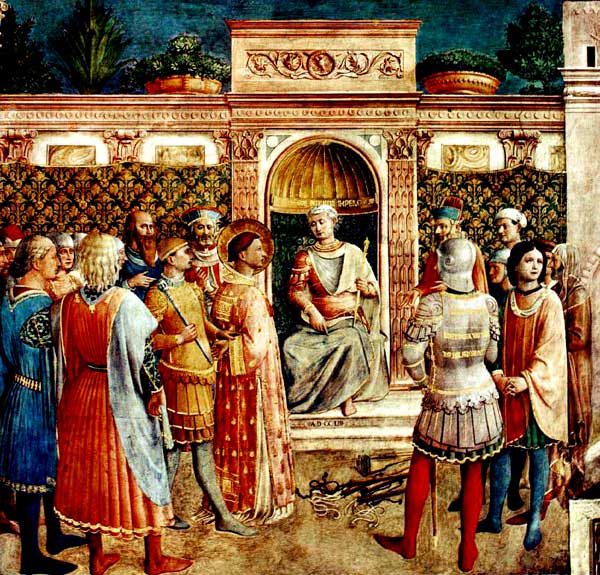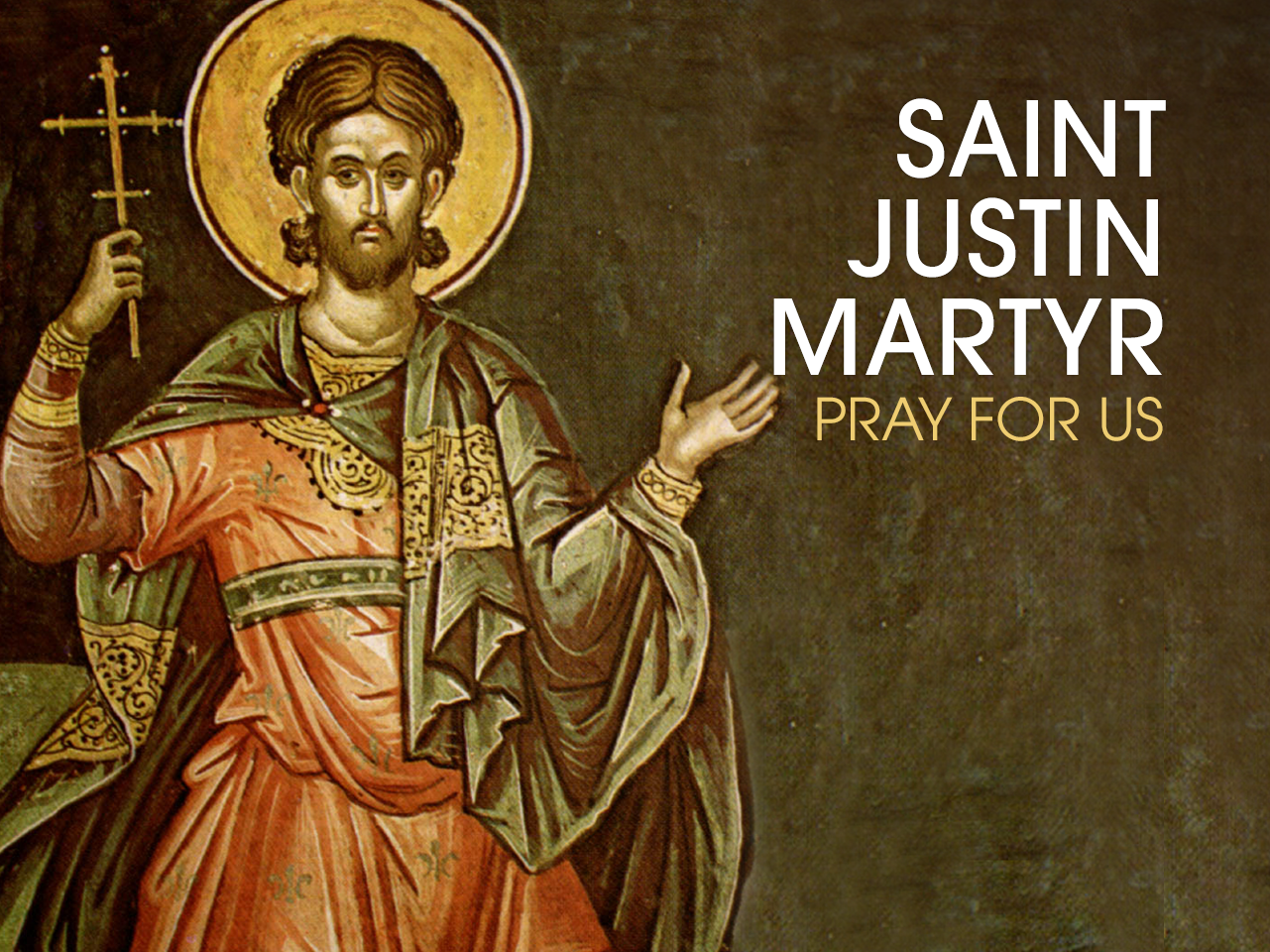All the voices around Justin clamored that they had the truth he sought so desperately. He had listened to them all since he first came to Rome to get his education. They each shouted that they held the one and only answer but he felt no closer to the truth than when he had started his studies. He had left the Stoic master behind but the Stoics valued discipline as truth and thought discussion of God unnecessary. He had rejected the Peripatetic who seemed more interested in money than discussion. The Pythagorean had rejected him because he didn’t know enough music and geometry — the things that would lead him to truth. He had found some joy with the Platonists because the contemplation of ideas gave wings to his mind, but they had promised wisdom would let him see God and so, where was God?
There was one place that Justin always escaped to in order to get away from these shouting, confusing voices and search out the quiet inner voice that led him to truth. This place was a lonely spot, a path that seemed made for him alone in a field by the sea. So sure was he of the isolation of his retreat that he was shocked one day to find an old man following him.
The old man was not searching for truth but for some of his family. Nonetheless they began a discussion in which Justin identified himself as a philologian, a lover of reason. The old man challenged him — why was he not a lover of truth, a lover of deeds. Justin told him that reason led to truth, and philosophy led to happiness. This was certainly an interesting thing for Justin to say since he had not found the truth in the study of reason or happiness in his quest among the philosophers! Perhaps the old man sensed this for he asked for Justin’s definition of philosophy and of happiness.
In the long discussion that followed, Justin spoke eloquently to the old man’s searching questions but even Justin had to admit that philosophers may talk about God but had never seen him, may discuss the soul but didn’t really know it. But if the philosophers whom Justin admired and followed couldn’t, then nobody could, right?
The old man told him about the ancient prophets, the Hebrew prophets, who had talked not of ideas but of what they had seen and heard, what they knew and experienced. And this was God. The old man ended the conversation by telling Justin to pray that the gates of light be opened to him.
Inflamed by this conversation, Justin sought out the Scriptures and came to love them. Christ words “possess a terrible power in themselves, and are sufficient to inspire those who turn aside from the path of rectitude with awe; while the sweetest rest is afforded those who make a diligent practice of them.”
Why hadn’t Justin known about Christianity before with as much as he had studied? He had heard about it, the way other pagans of second century Rome had, by the rumors and accusations that surrounded the persecution of Christians. The fearlessness of their actions made him doubt the gossip, but he had nothing else to go by. Christians at that time kept their beliefs secret. They were so afraid that outsiders would trample on their sacred faith and desecrate their mysteries that they wouldn’t tell anyone about their beliefs — even to counteract outright lies. To be honest, there was good reason for their fears — many actors for example performed obscene parodies of Christian ritual for pagan audiences, for example.
But Justin believed differently. He had been one of those outsiders — not someone looking for trouble, but someone earnestly searching for the truth. The truth had been hidden from him by this fear of theirs. And he believed there were many others like him. He exhorted them that Christians had an obligation to speak of their faith, to witness to others about their faith and their mysteries.
Justin never ended his quest for religious truth even when he converted to Christianity at the age of thirty after years of studying various pagan philosophies.
As a young man, he was principally attracted to the school of Plato. However, he found that the Christian religion answered the great questions about life and existence better than the philosophers.
Upon his conversion he continued to wear the philosopher’s mantle, and became the first Christian philosopher. He combined the Christian religion with the best elements in Greek philosophy. In his view, philosophy was a pedagogue of Christ, an educator that was to lead one to Christ.
Justin is known as an apologist, not someone who apologizes, but rather someone who defends in writing the Christian religion against the attacks and misunderstandings of the pagans. Two of his so-called apologies have come down to us; they are addressed to the Roman emperor and to the Senate. He also opened a school of debate in Rome. Naturally, he came to the attention of the Roman authorities.
Justin was arrested during the persecution of Emperor Marcus Aurelius along with four other Christians: Chariton, Charites, Paeon, and Liberianus.
“The saints were seized and brought before the prefect of Rome, whose name was Rusticus. As they stood before the judgment seat, Rusticus the prefect commanded Justin, “Above all, have faith in the gods and obey the emperors.”
Justin replied, “We cannot be accused or condemned for obeying the commands of our Savior, Jesus Christ.”
Rusticus said, “What system of teaching do you profess?”
Justin said, “I have tried to learn about every system, but I have accepted the true doctrines of the Christians, though these are not approved by those who are held fast by error.”
The prefect Rusticus said, “Are those doctrines approved by you, wretch that you are?”
Justin said, “Yes, for I follow them with their correct teaching.”
The prefect Rusticus said, “What sort of teaching is that?”
Justin said, “Worship the God of the Christians. We hold him to be from the beginning the one creator and maker of the whole creation, of things seen and things unseen. We worship also the Lord Jesus Christ, the Son of God.”
Rusticus said, “You are a Christian, then?”
Justin said, “Yes, I am a Christian.”
The prefect said to Justin, “You are called a learned man and think you know what is true teaching. Listen: if you were scourged and beheaded, are you convinced that you would go up to heaven?”
Justin said, “I hope that I shall enter God’s house if I suffer in that way. For I know that God’s favor is stored up until the end of the whole world for all who have lived good lives.”
The prefect Rusticus said, “Do you have an idea that you will go up to heaven to receive some suitable rewards?”
Justin said, “It is not an idea that I have; it is something I know well and hold to be most certain.”
The prefect Rusticus said, “Now let us come to the point at issue, which is necessary and urgent. Gather round then and with one accord offer sacrifice to the gods.”
Justin said, “No one who is right-thinking stoops from true worship to false worship.”
The prefect Rusticus said, “If you do not do as you are commanded you will be tortured without mercy.”
Justin said, “We hope to suffer torment for the sake of our Lord Jesus Christ, and so be saved.” In the same way the other martyrs also said, “Do what you will. We are Christians; we do not offer sacrifice to idols.”
The prefect Rusticus pronounced sentence, saying, “Let those who have refused to sacrifice to the gods and to obey the command of the emperor be scourged and led away to suffer capital punishment according to the ruling of the laws.” Glorifying God, the holy martyrs were beheaded, and so fulfilled their witness of martyrdom in confessing their faith in their Savior.” – from the Acts of the Martyrdom of Saint Justin and his Companions
“We pray for our enemies; we seek to persuade those who hate us without cause to live conformably to the goodly precepts of Christ, that they may become partakers with us of the joyful hope of blessings from God, the Lord of all.”
―St. Justin Martyr
“By examining the tongue of a patient, physicians find out the diseases of the body, and philosophers the diseases of the mind.”
―St. Justin Martyr
“Wherein is it possible for us, wicked and impious creatures, to be justified, except in the only Son of God? O sweet reconciliation! O untraceable ministry! O unlooked-for blessing! that the wickedness of many should be hidden in one godly and righteous man, and the righteousness of one justify a host of sinners!”
―St. Justin Martyr
“We’ve been taught that God did not make the world for no reason, but for the sake of the human race. As I said before, he takes pleasure in those who imitate his attributes, and is displeased with those who embrace what is worthless, whether in word or deed.”
—St. Justin Martyr
“The world suffers nothing from Christians but hates them because they reject its pleasures.”
-St. Justin Martyr
“No one in his right mind gives up piety for impiety.”
~ Justin Martyr, apologist, Saint; in answer to the Prefect Rusticus who had demanded sacrifice to the Roman gods; from the trial transcript by Tatian (A.D. 165).
“And this food is called among us Eucharistia [the Eucharist], of which no one is allowed to partake but the man who believes that the things which we teach are true, and who has been washed with the washing that is for the remission of sins, and unto regeneration, and who is so living as Christ has enjoined.
For not as common bread and common drink do we receive these; but in like manner as Jesus Christ our Saviour, having been made flesh by the Word of God, had both flesh and blood for our salvation, so likewise have we been taught that the food which is blessed by the prayer of His word, and from which our blood and flesh by transmutation are nourished, is the flesh and blood of that Jesus who was made flesh.”
– Saint Justin Martyr (First Apology, 66, 153-155 AD)
Prayer to St Justin Martyr:
Saint Justin Martyr, pray that in our search for the Truth, God will open the gates of light for us the way He did for you and give us the wisdom no human being can give. Amen
Love,
Matthew


